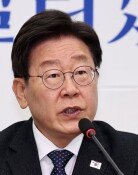N. Korea's provocation despite inauguration of South's liberal administration
N. Korea's provocation despite inauguration of South's liberal administration
Posted May. 15, 2017 07:19,
Updated May. 15, 2017 07:34
North Korea fired a ballistic missile from a site near Kusong in North Pyongan Province on Sunday morning. The firing came only four days after the new South Korean administration inaugurated. The missile is believed to be a new intermediate range ballistic missile (IRBM) because it was fired a high-angle launch to enable it to reach up to 2,000 kilometers in altitude and flew about 700 kilometers, and if it was fired normally, it would have flown up to 4,000 kilometers. The missile does not reach the range of an intercontinental ballistic missile, but the North has demonstrated the capability of its IRBM that can strike the U.S. airbase in Guam.
South Korean President Moon Jae-in immediately convened a standing committee meeting of the National Security Council in the wake of Pyongyang’s missile provocation, which is already the third this year. President Moon condemned the North by calling it "grave act of provocation" and stated, “Although the South leave open the possibility for dialogue with North Korea, we have to sternly respond to (the North’s) provocation to ensure that (Pyongyang) does not make ill-advised judgment.” The president went on to say, “Even if dialogue is possible, we have to demonstrate that it will be only possible when the North changes its attitude,” in repeatedly stressing the possibility for dialogue and the necessary conditions.
The latest provocation can be construed as the North’s yet another challenge against U.S. President Donald Trump and Chinese President Xi Jinping, who are collaborating to address the North’s nuclear issue through "maximum pressure and intervention." Particularly, the provocation came at a time when the U.S. aircraft carrier Carl Vinson is engaged in a joint South Korea-U.S. military drill in the East Sea, and on the very day when China kicked off the International Cooperation Summit Forum on the Belt and Road Initiative in 2017. The North reaffirmed that it will continue its missile development irrespective of shift of the mood towards dialogue as the launch came immediately after Choe Son Hui, the chief of the U.S. bureau at the North’s foreign ministry, completed 1.5 track dialogue between North Korea and the U.S. in Norway. The North Korean official stated that the North will hold dialogue (with the U.S.) if conditions permit and will keep a watch (on the Moon Jae-in administration).
Seoul should be aware that Pyongyang's provocation four days after President Moon’s inauguration is aimed at testing the attitude of Moon who has emphasized dialogue over pressure against Pyongyang. “The hardline policy towards North Korea over the past 10 years only brought about more frequent nuclear and missile tests by the North,” said Chung Ui-yong, former South Korean head of mission to Geneva and the current head of the presidential office’s foreign affairs, national security policy taskforce, in criticizing the previous South Korean administrations. However, considering the latest provocation, we wonder whether Pyongyang is finding it easier to deal with the Moon Jae-in administration, which seeks change by embracing dialogue.
President Moon emphasized on Sunday the South Korean military’s preparedness including the early introduction of the Korea Air & Missile Defense system. However, if the North makes provocation the way it did on Sunday, the South cannot block the North’s missile with the Patriot missile (PAC-3), a KAMD system, but can intercept it with the Terminal High Altitude Area Defense system. This is the reason President Moon should make the deployment of THAAD a done deal, and reconsider his election pledge to use reconciliatory policy dubbed “Sunshine Policy 2.” In his interview with NBC TV on Friday, President Donald Trump said, “He (Moon Jae-in) is more open to discussion. I don't mind discussion, but it's under certain circumstances.” Rather than blindly pursuing “wishful thinking,” President Moon should send the North a stern joint South Korea-U.S. message by hurriedly setting up his diplomacy and national security team that can analyze Pyongyang’s real intentions and ambition.







